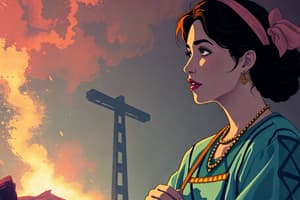Podcast
Questions and Answers
How do gender, religion, and caste intersect in society?
How do gender, religion, and caste intersect in society?
- By forming complex and multifaceted social dynamics (correct)
- By completely segregating into distinct categories
- In a simple and straightforward manner
- By having no impact on each other
What is gender primarily influenced by?
What is gender primarily influenced by?
- Occupational roles
- Social constructs, norms, and beliefs (correct)
- Caste identities
- Religious teachings
How does religion reinforce gender roles?
How does religion reinforce gender roles?
- By promoting equality between genders
- By challenging traditional gender norms
- By completely ignoring gender differences
- By shaping and reinforcing gender norms and roles (correct)
Which religious text prescribes different roles for men and women in religious spheres?
Which religious text prescribes different roles for men and women in religious spheres?
How does Hinduism's caste system impact gender roles?
How does Hinduism's caste system impact gender roles?
What factors can influence the organization of people in the caste system?
What factors can influence the organization of people in the caste system?
Which factor influences access to power, resources, and opportunities according to the text?
Which factor influences access to power, resources, and opportunities according to the text?
In Hinduism, which system reinforces gender-based roles?
In Hinduism, which system reinforces gender-based roles?
Which factor often prevents women from accessing religious leadership roles?
Which factor often prevents women from accessing religious leadership roles?
What does the Bahá'í Faith emphasize?
What does the Bahá'í Faith emphasize?
Which factor can perpetuate gender-based violence according to the text?
Which factor can perpetuate gender-based violence according to the text?
What is essential for promoting justice, equality, and empowerment in society according to the text?
What is essential for promoting justice, equality, and empowerment in society according to the text?
Study Notes
Understanding Gender, Religion, and Caste Intersections
Throughout the world, gender, religion, and caste intersect to form complex and multifaceted social dynamics. Each of these aspects encompasses a rich tapestry of identity, customs, and beliefs. Let's unravel these intersections and explore their historical and contemporary influences.
Gender
Gender, a social construct, is often used to assign roles and responsibilities within society. This construct is influenced by cultural expectations, norms, and beliefs. Gender intersects with religion in various ways, including religious teachings on masculinity and femininity, religious roles and expectations, and religious spaces and practices. For example, some religious texts, like the Quran, prescribe different roles for men and women in religious spheres, with men usually taking on leadership positions and women confined to more supportive roles.
Religion
Religion is a set of beliefs and practices that often guide individuals in their daily lives. Religious beliefs have the power to shape and reinforce gender norms and roles, as well as influence caste identities. For instance, Hinduism's caste system, often perpetuated by religious teachings, reinforces gender roles and hierarchies that favor men over women.
Caste
Caste is a social hierarchy that organizes people into hierarchical groups based on various factors, including birth, wealth, occupation, and religion. One's caste influences their access to power, resources, and opportunities. Caste intersects with gender and religion in various ways, including the perpetuation of gender roles and religious beliefs. For example, in Hinduism, the caste system often reinforces gender-based roles, with some castes being primarily responsible for traditionally feminine tasks like weaving and spinning.
Intersections
Several intersections between gender, religion, and caste exist globally. These intersections can illuminate systemic inequalities and injustices or reinforce empowering religious and spiritual practices.
- Patriarchy and Religious Authority: In many religious traditions, male authority is privileged over female authority. This hierarchy reinforces gender inequalities and often prevents women from accessing religious leadership roles.
- Gender-Based Divisions of Labor: Caste and religious beliefs often influence gender-based divisions of labor, with some castes and religions confining women to more domestic roles.
- Religious Education and Women's Empowerment: Some religious traditions and movements empower women by promoting gender equality and providing religious education opportunities. For example, the Bahá'í Faith emphasizes gender equality and provides equal education opportunities for women and men.
- Religious Belief and Gendered Violence: Religious beliefs can perpetuate gender-based violence, such as honor killings, domestic violence, and sexual abuse.
Contemporary Challenges and Opportunities
The intersections of gender, religion, and caste present both challenges and opportunities for social justice. Contemporary challenges include gender-based violence, gender inequalities in religious institutions, and the perpetuation of caste-based inequalities. However, opportunities also exist, such as the promotion of gender equality and women's empowerment within religious traditions, and the use of religious beliefs to challenge caste-based injustices.
In conclusion, gender, religion, and caste intersect in complex and multifaceted ways, shaping social dynamics and influencing identity, beliefs, and practices. Understanding these intersections is essential for promoting justice, equality, and empowerment in society.
Studying That Suits You
Use AI to generate personalized quizzes and flashcards to suit your learning preferences.
Description
Explore the complex intersections of gender, religion, and caste, uncovering historical and contemporary influences on social dynamics and identity. Delve into the roles, beliefs, and practices that shape these intersections and their implications for justice and empowerment.




